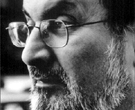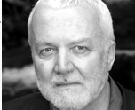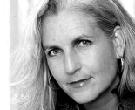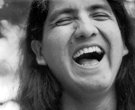Expert Advice
Salman Rushdie, Melissa Bank, Michael Lewis, Terry Tempest Williams, and others want you to read this book.
BY The Editors
 Salman Rushdie
Salman Rushdie
Salman Rushdie is the author of 15 books, including Midnight’s Children (for which he won the Booker Prize), and Shalimar the Clown.
 War Music by Christopher Logue
War Music by Christopher Logue
Logue’s encounter with Homer (War Music is a version of several books of the Iliad) has created an exceptional “third poet,” just as Fitzgerald’s encounter with Omar Khayyam once did. Logue’s versions are muscular and contemporary, but with all the power of the classics: quite amazing, really.
 Melissa Bank
Melissa Bank
Melissa Bank is the author of The Wonder Spot and the best-selling The Girls’ Guide to Hunting and Fishing. She divides her time between New York City and East Hampton.
 The Trouble with Poetry by Billy Collins
The Trouble with Poetry by Billy Collins
I give this book to everyone (especially those who think they don’t understand or like poetry) because it’s as accessible as it is brilliant, not to mention hilarious.
 Russell Banks
Russell Banks
Russell Banks is the author of 15 works of fiction, including The Book of Jamaica, Continental Drift, Rule of the Bone, Cloudsplitter, and his most recently published novel, The Darling. He lives in upstate New York with his wife, the poet Chase Twichell.
 Declension in the Village of Chung Luong by Bruce Weigl
Declension in the Village of Chung Luong by Bruce Weigl
Bruce Weigl's Declension in the Village of Chung Luong takes this 'low dishonest decade' we're living through and strips away the lies and vulgarity and kitsch and lets us see our daily lives and our shared history with emotional and moral clarity again.
 Michael Lewis
Michael Lewis
Michael Lewis is the author of several best-selling books, including Liar’s Poker (the number-one New York Times national best-seller), Moneyball, and The Blind Side: Evolution of a Game.
 Collected Poems by Philip Larkin
Collected Poems by Philip Larkin
Philip Larkin’s poems usually persuade me that no matter how miserable my life may seem to me, someone else’s life was worse: Philip Larkin’s. But they also remind me that it’s possible for a writer (a) to make extremely interesting sounds on the page while at the same time saying extremely interesting things, and (b) to write clearly and seemingly simply without being simple at all. I love Larkin’s poems also for the way they capture the feel of Britain before it rediscovered Prosperity. They deliver their humor and wisdom through the most appallingly bad teeth.
 Ursula K. Le Guin
Ursula K. Le Guin
Ursula K. Le Guin is the author of six volumes of poetry, most recently Incredible Good Fortune, and is the translator of the Selected Poems of Gabriela Mistral.
 I’m going Christmas shopping today for a granddaughter who just turned 13. I want to give her the Oxford Book of English Verse and the first volume of the Library of America’s beautiful American Poetry: The Twentieth Century. I hope she dips in, and wonders, and wanders, and slowly explores them. I hope they go through life with her, as the Oxford Book of English Verse my father gave me when I was 13 has gone with me.
I’m going Christmas shopping today for a granddaughter who just turned 13. I want to give her the Oxford Book of English Verse and the first volume of the Library of America’s beautiful American Poetry: The Twentieth Century. I hope she dips in, and wonders, and wanders, and slowly explores them. I hope they go through life with her, as the Oxford Book of English Verse my father gave me when I was 13 has gone with me.
 Luis Alberto Urrea
Luis Alberto Urrea
Luis Alberto Urrea is the author of several volumes of poetry, as well as nonfiction works The Devil’s Highway, which was a finalist for the 2005 Pulitzer Prize for general nonfiction, and Across the Wire. He teaches creative writing at the University of Illinois in Chicago.
 For awesome holiday poetry books, I would recommend the following four books: Ted Kooser and Jim Harrison, Braided Creek: Delicacy and beauty and wry humor as two veteran poets send haiku-like poems to each other on post cards. Mary Oliver, Selected Poems: Either volume will warm even a poetry-hater's heart. A.R. Ammons, The Really Short Poems of A.R. Ammons: At once hilarious and stunning, these small poems change your perceptions of the world in delightful ways. Pablo Neruda, Twenty Love Poems and a Song of Despair: Latin America's all-time favorite poetry book: love, love, love.
For awesome holiday poetry books, I would recommend the following four books: Ted Kooser and Jim Harrison, Braided Creek: Delicacy and beauty and wry humor as two veteran poets send haiku-like poems to each other on post cards. Mary Oliver, Selected Poems: Either volume will warm even a poetry-hater's heart. A.R. Ammons, The Really Short Poems of A.R. Ammons: At once hilarious and stunning, these small poems change your perceptions of the world in delightful ways. Pablo Neruda, Twenty Love Poems and a Song of Despair: Latin America's all-time favorite poetry book: love, love, love.
 Terry Tempest Williams
Terry Tempest Williams
Terry Tempest Williams is the author of Refuge: An Unnatural History of Family and Place, and, most recently, The Open Space of Democracy. She is the Annie Clark Tanner Scholar in the Environmental Humanities Program at the University of Utah.
 Migration by W.S. Merwin; Four Quartets by T.S. Eliot; Given Sugar, Given Salt by Jane Hirshfield; The Weather by Lisa Robertson; The Four Questions of Melancholy by Tomaz Salamun, translated by Christopher Merrill.
Migration by W.S. Merwin; Four Quartets by T.S. Eliot; Given Sugar, Given Salt by Jane Hirshfield; The Weather by Lisa Robertson; The Four Questions of Melancholy by Tomaz Salamun, translated by Christopher Merrill.
 Sherman Alexie
Sherman Alexie
A Spokane/Coeur d'Alene Indian, Sherman Alexie was born in October 1966 and grew up on the Spokane Indian Reservation in Wellpinit, Washington. He is the author of many books, including The Business of Fancydancing, The Lone Ranger and Tonto Fistfight in Heaven, and Ten Little Indians. He is currently working on a young adult novel, The Absolutely True Diary of a Part-Time Indian, which will be published in 2007.
 Green Squall by Jay Hopler
Green Squall by Jay Hopler
The poems in Green Squall, with their mix of straight talk and dream-like imagery, will linger after you put the book down.
 Jennifer Egan
Jennifer Egan
Jennifer Egan was born in Chicago and raised in San Francisco. She is the author of several books, including Look at Me, which was a finalist for the National Book Award, and most recently, The Keep. She lives in Brooklyn with her husband and sons.
 The Cantos by Ezra Pound
The Cantos by Ezra Pound
This sprawling volume, written over many years, contains passages of sublime beauty and also of utter nonsense. In one sense it’s the record of a vigorous and at times disturbed and benighted life; Pound is well known for his support of Mussolini during World War II and for his anti-Semitism. But the poetry itself, especially in the early cantos and the Pisan cantos, which Pound wrote while imprisoned for treason at an American detention camp in Pisa, is remarkable, displaying his gifts for translation, lyricism, and historical synthesis. This is a volume to dip into over time, luxuriating in the best parts. A companion guide, which will explain some of Pound’s historical and literary references (there’s a lot about obscure Renaissance turf wars) is helpful in gaining an understanding of the poetry, but is not necessary to experience its dreamlike beauty and power.
 Gary Shteyngart
Gary Shteyngart
Gary Shteyngart was born in Leningrad, USSR, in 1972, and came to the United States seven years later. His two novels are The Russian Debutante’s Handbook and Absurdistan, which was recently chosen by the New York Times Sunday Book Review as one of the 10 best books of 2006.
 Collected Poems in English by Joseph Brodsky
Collected Poems in English by Joseph Brodsky
Brodsky’s collected poems continue to dazzle me. I love what he does with the town of my birth, capturing St. Petersburg in a way that I think makes future literary forays into its cityscape somewhat redundant.
 Colum McCann
Colum McCann
Colum McCann is the author of two collections of short stories and three novels, including This Side of Brightness and Dancer, both of which were international best-sellers. His most recent novel, Zoli, a story of a Gypsy poet and intellectual, will be published in the United States in early 2007. Photo by James Higgins.
 I am reminded, since it’s gift-giving season, of my father’s old twist: “Don’t put all your begs in one ask-it.”
I am reminded, since it’s gift-giving season, of my father’s old twist: “Don’t put all your begs in one ask-it.”
Irish poets came up trumps this year with a number of wonderful volumes. There was Seamus Heaney’s District and Circle, of course, Michael Longley’s Collected Poems, and Paul Muldoon’s Horse Latitudes. Startling volumes not yet published in the United States came from Greg Delanty, Mary O’Malley, and John F Deane. We wait for them.
The other book I’m giving this year is Jim Harrison’s Saving Daylight (Copper Canyon Press). I suppose finding a good book is somewhat like getting back to the days we have cared deeply about. Harrison has his finger on the pulse of the moment or, as he said himself, the pulse of the wound. There are some deeply necessary poems here: angry and tender both. The poems, when read together, have a swift narrative run-along. I think he’s one of America’s greatest contemporary voices. We’ve adopted him in Ireland. In this respect we battle with the French, who have valued Harrison for quite a while too. On any journey I’m not without a Harrison volume.
 Mark Wilding
Mark Wilding
Mark Wilding is currently a writer and co–executive producer on ABC’s hit drama Grey’s Anatomy. He’s been a TV writer for 15 years. Previous television credits include, among others, Charmed, Jake 2.0, Jesse, Working, Caroline in the City, The Naked Truth, and Ellen.
 The Dead and the Living by Sharon Olds
The Dead and the Living by Sharon Olds
“Hitler entered Paris the way my / sister entered my room at night / sat astride me, squeezed me with her knees / held her thumbnails to the skin of my wrists and / peed on me, knowing Mother would / never believe my story.”
That is the opening line of Sharon Olds’s poem “The Takers.” It’s from her book The Dead and the Living, which was published in 1984. I was asked to recommend one of my favorite books of poetry, and this was an easy choice, mainly because it’s a book I always return to. At least once a year, I pull it from my bookshelf and sit down to enjoy it for an hour or two. And I’m always blown away by lines like the above. I’m a writer who knows, sadly, that he’ll never write anything that beautiful. Olds’s poems are hard, sad, sometimes brutal and sometimes, dare I say, funny. Her writing is elegant. Her metaphors are uncanny. And her pain leaps from the page, sucking you in and making you curiously grateful for whatever horrors she had to endure to get her to such a wonderfully creative place.
 Ilan Stavans
Ilan Stavans
Ilan Stavans is Lewis-Sibring Professor of Latin American and Latino Cultures at Amherst College. His books include On Borrowed Words, The Riddle of Cantinflas, and The Oxford Book of Jewish Stories.
 I recommend Martin Espada's The Republic of Poetry, a portion of which stands as a tribute to Pablo Neruda's legacy as the perennial poet laureate of the Americas; Robert Fagles's extraordinary new translation of Virgil's Aeneid, for having the temerity to make a classic fresh again; and Zbigniew Herbert's Collected Poems: 1956-1998 (due out in February), offering us the chance to appreciate the artistic arc of one of the most probing "rational" poets of the 20th century and an outstanding essayist as well.
I recommend Martin Espada's The Republic of Poetry, a portion of which stands as a tribute to Pablo Neruda's legacy as the perennial poet laureate of the Americas; Robert Fagles's extraordinary new translation of Virgil's Aeneid, for having the temerity to make a classic fresh again; and Zbigniew Herbert's Collected Poems: 1956-1998 (due out in February), offering us the chance to appreciate the artistic arc of one of the most probing "rational" poets of the 20th century and an outstanding essayist as well.
 Peter Campion
Peter Campion
Peter Campion is the author of a book of poems, Other People, and a monograph on the painter Mitchell Johnson. He is a regular contributor to Poetry.
 The Changing Light at Sandover by James Merrill
The Changing Light at Sandover by James Merrill
James Merrill’s The Changing Light at Sandover reads like a steroid supplement for the imagination. Pummeled as we are during this season by our cluttering consumerism, it’s enabling to know that largesse can also be a good thing. When my semester of teaching ends, I plan on reading Sandover with the same (somewhat disturbing?) gusto my younger relatives show as they devour their main courses of Harry Potter and their postprandial Lemony Snickets. Sandover resembles nothing so much as a great holiday feast. It’s parody that becomes genuine spiritual search, elegy that ends up as gossip, memoir that slides into Mallarm�an ectoplasm. And at the heart of its structure lies a love story:
The Book of a Thousand and One Evenings Spent
With David Jackson at the Ouija Board
In Touch with Ephraim Our Familiar Spirit.
It remains the best poem I know about marriage.
Brian Phillips
Brian Phillips is a regular reviewer for Poetry.
 Old Possum’s Book of Practical Cats by T.S. Eliot
Old Possum’s Book of Practical Cats by T.S. Eliot
Is there anyone else out there with the secret suspicion that this is Eliot’s best work? A collection of perfectly frivolous poems for children, set in a bizarre late-Victorian England populated by anthropomorphic cats, it makes no claim to moral gravity, but achieves a kind of controlled giddiness that feels, at times, unnervingly close to pure poetry. It makes a wonderful gift, even for an adult; and if you’re shopping for a child, you can’t do better. Not even Andrew Lloyd Webber—who, in his role as an instrument of evil, once set the text to a weak late-’70s drag-show soundtrack and made a run at staging it on Broadway—could ruin it. Could a book earn higher praise?
 D.H. Tracy
D.H. Tracy
D.H. Tracy’s poetry and criticism appear widely. He lives in Illinois, and regularly writes for Poetry.
 The Torrent and the Night Before by Edwin Arlington Robinson
The Torrent and the Night Before by Edwin Arlington Robinson
This facsimile edition of E.A. Robinson’s first book came out 10 years ago, to commemorate the 100th anniversary of its publication. Robinson had to self-publish his debut, but it proved to contain some gems (such as “Her Eyes,” “Luke Havergal,” and “John Evereldown”), and the following year he was able to bring out a revised collection that caught the attention and patronage of President Teddy Roosevelt. This edition has snob value for poetry fans, yet is accessible enough for novices; it’s intimate enough for your dearest loved one, yet stodgy enough for your business associates. Suitable for Democrats and Republicans alike.
The editorial staff of the Poetry Foundation. See the Poetry Foundation staff list and editorial team masthead.


